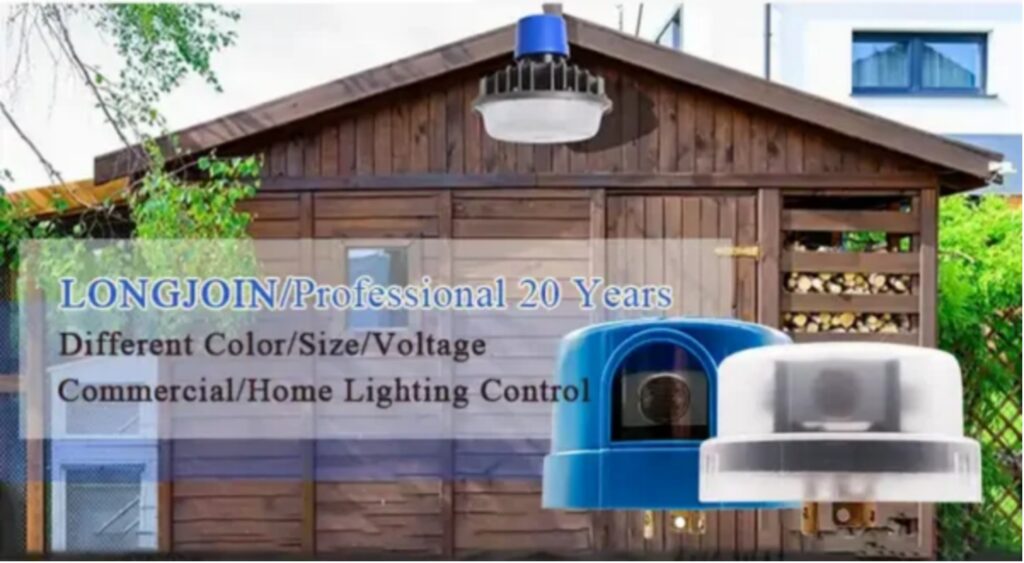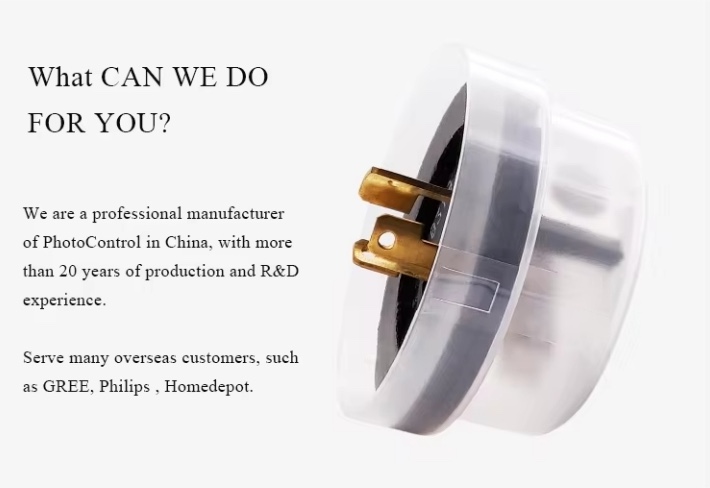Outline
- Introduction
- Feature Overview
- Intelligent Dimming
- Midnight Dimming
- Lumen Depreciation Compensation
- System Integration Benefits
- Customized Solutions for Users
- Cost-Efficiency Analysis
- Installation & Maintenance Guide
- Installation Procedures
- Site Assessment
- Mounting
- Wiring
- Configuration
- Maintenance Tips
- Installation Procedures
- Regular Inspections:
- Firmware Updates
- Troubleshooting
- Environmental Protection
- Success Stories
- City of Greenfield
- Sunnyvale Park
- Riverside Mall
- The Bottom Line
Multiple challenges are associated with outdoor lighting, ranging from energy inefficiency to maintenance costs. While conventional systems were a good start, they usually failed to respond adequately to the demands placed by modern urban settings, leading to a waste of resources and an unoptimal performance.
Long-Join photocells are the turning point for smart transitions in outdoor lighting. These state-of-the-art devices not only improve energy use but are also compatible with smart city initiatives, which makes precision and reliability possible.
In the following sections, we will explore the key features, benefits, and real-world applications of Long-Join photocells.

Feature Overview
Long-Join photocell sensors stand out with their advanced features, ensuring efficient and reliable outdoor lighting systems. Here are the key functions that make them indispensable:
Intelligent Dimming
Long-Join photocells incorporate intelligent dimming technology, allowing for precise control over lighting levels based on real-time conditions. This feature adjusts brightness automatically, optimizing energy usage and maintaining appropriate illumination, thereby enhancing both safety and efficiency in outdoor spaces.
Midnight Dimming
As the name indicates, midnight dimming reduces light intensity during late-night hours when pedestrian and vehicular traffic is minimal. This feature of long-join light photocells not only conserves energy but also extends the lifespan of lighting fixtures, resulting in significant cost savings and reduced environmental impact.
Lumen Depreciation Compensation
To combat the natural decline in light output over time, Long-Join photocells include lumen depreciation compensation. This function ensures consistent illumination by automatically adjusting the power supplied to the lamps, maintaining optimal light levels throughout the product’s life cycle, and thereby enhancing the overall reliability and performance of outdoor lighting systems.
System Integration Benefits

Long-Join photocells are designed to integrate seamlessly with existing lighting infrastructure, making them ideal for smart city projects. These photocell lighting sensors support various communication protocols, such as DALI, 0-10V, and Zigbee, enabling effortless connection to central control systems and other smart devices. This compatibility ensures that cities can upgrade their lighting systems without extensive overhauls, saving both time and resources.
Further, their integration capabilities allow for real-time monitoring and management of outdoor lighting. This enables cities to adjust lighting schedules, detect faults, and perform maintenance remotely, significantly reducing operational costs.
Additionally, these photo sensors can be incorporated into broader smart city ecosystems, linking with traffic management, public safety, and environmental monitoring systems.
By facilitating seamless integration, Long-Join photocells enhance the efficiency and effectiveness of urban lighting, contributing to the overall smart transformation of cities.
Customized Solutions for Users
Long-Join understands that different projects have unique lighting requirements. To address this, they offer tailored photocell solutions designed to meet diverse needs, enhancing both lighting effects and energy savings.
For projects requiring specific lighting levels or patterns, Long-Join has got you covered. These photocells are equipped with programmable adjustments that alter the illumination based on the time of the day, season, or specific events; thus ensuring proper light intensity while using less power.
Furthermore, Long-Join’s photocells can be adjusted according to environmental conditions. These light sensors are made to handle extreme environments in order to guarantee their extended operation and lifespan, whether for coastal areas with high humidity and salt exposure or urban centers with heavy pollution.
In addition to this comes advanced options such as adaptive lighting controls that respond to real-time data from sensors and smart city networks. This feature allows for modifying lighting dynamically depending on pedestrian and vehicular movements on the streets, and weather variations among other factors thereby further optimizing energy consumption while enhancing security measures.
Cost-Efficiency Analysis
Long-Join photocells offer substantial long-term operational cost reductions, making them a smart investment for outdoor lighting systems. By utilizing advanced features such as intelligent dimming and lumen depreciation compensation, these outdoor photocell light sensors ensure optimal energy usage, which translates into significant savings.
A comparative analysis reveals that Long-Join photocells can reduce energy consumption by up to 40% compared to traditional lighting systems. This reduction is achieved through precise control of light levels, adapting to real-time conditions, and minimizing unnecessary illumination. For instance, midnight dimming can reduce up to 30% of electricity usage during periods when there are few people moving around within some towns or cities.
Additionally, the longer lifespan of lighting fittings results in fewer replacements and less money spent on their maintenance. The Long-Join photocells alone could save municipalities or urban authorities thousands upon thousands per light fixture over a decade.
The integration capabilities of Long-Join photocells also contribute to cost efficiency. Remote monitoring and management reduce the need for manual inspections and enable quick response to maintenance issues, further lowering operational costs.
Installation & Maintenance Guide
Installation Procedures
Site Assessment
Evaluate the lighting infrastructure and determine the optimal placement for photocells.
Ensure compatibility with existing systems, including power supply and control units.
Mounting
Use appropriate brackets or mounting hardware in order to attach a photocell on poles or lamp fixtures.
Set the photocell away from objects like trees and building structures that may influence its ability by blocking it out.
Wiring
Follow the manufacturer’s wiring diagram to connect the photocell switch to the power supply and control circuit.
To avoid short circuits or corrosion, never leave any connection exposed; instead, ensure it’s secure and waterproofed.
Configuration
Set dimming schedules and sensitivity levels according to user preference.
Check if everything works well by testing it actually before using it.
Maintenance Tips
Regular Inspections:
Maintains periodic checks for wear and tear signs as well as an accumulation of debris on your gadget. Time does not have friends, so why wait till they stop functioning? Additionally, ensure photocell lenses are clean like dust impeding their proper functioning
Firmware Updates
Regularly update the photocell firmware to benefit from the latest features and improvements.
Follow the manufacturer’s instructions for safe and effective updates.
Troubleshooting
Address any operational issues promptly by consulting the troubleshooting guide or contacting technical support.
Keep a log of maintenance activities and any issues encountered for future reference.
Environmental Protection
Ensure that the photo sensors are protected from extreme weather conditions by using appropriate enclosures or shields.
Replace any damaged components immediately to maintain optimal performance.
By following these installation and maintenance guidelines, users can ensure the longevity and efficiency of their Long-Join photocells, enhancing overall outdoor lighting performance.
Success Stories

City of Greenfield
In Greenfield, the integration of Long-Join photocells into the street lighting system resulted in a 35% reduction in energy consumption within the first year. The city’s public works director praised the easy installation and significant cost savings, noting improved lighting quality and reduced maintenance needs.
Sunnyvale Park
Sunnyvale Park installed Long-Join photocells across its expansive park area. Park visitors and staff reported enhanced safety and visibility, and the park management highlighted the seamless integration with their existing infrastructure.
Riverside Mall
Riverside Mall utilized Long-Join photocells to manage their outdoor and parking lot lighting. The lumen depreciation compensation feature maintained consistent lighting levels, leading to a significant decrease in energy bills and extending the life of their lighting fixtures. Mall operators commended the reliability and efficiency of the system.
The Bottom Line
Long-Join photocells are essential for transforming outdoor lighting systems into smart, efficient, and cost-effective solutions. Their advanced features, seamless integration, and customizable options make them the ideal choice for any smart city project. For a reliable supply of Long-Join photocells, Chi-Swear stands out as a trusted provider, ensuring high-quality products and exceptional service to meet your lighting needs.
External Links
- https://www.researchgate.net/publication/250917280_Lumen_Depreciation_Diagnosis_in_Modulated_LED_Lighting_Systems
- https://www.dali-alliance.org/dali
- https://en.wikipedia.org/wiki/Zigbee
- https://www.researchgate.net/publication/339309759_An_Energy-efficient_Smart_Street_Lighting_System_with_Adaptive_Control_based_on_Environment






